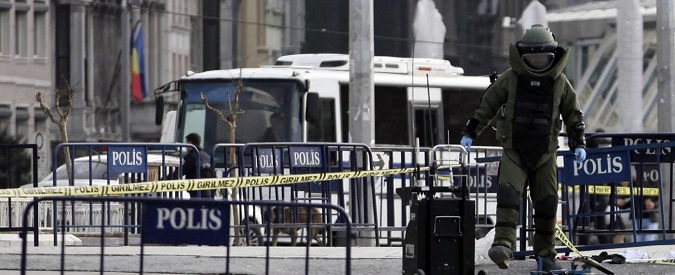Istanbul

Just in random order. Since I never covered Turkey, I am here for Syria – but it’s more than two years that I live here, so to speak. So why not.
For starting, a correction. About this new presidential palace in Ankara, there is a new press release: it has not a thousand rooms, it isn’t true – they are 1150. And everything is in proportion, here. During the last electoral campaign, the state TV dedicated to Erdogan, who became president after 11 years as prime minister, like Putin, 553 minutes. Three to his rival. The CNN instead, that has a local edition, a Turkish edition, during the Gezi Park demonstrations, a year ago, broadcasted a documentary on penguins: and so when the Kurds filled the streets, during the siege of Kobani, asking for the opening of the border, the deliver of humanitarian aid, and 40 people were killed in the clashes with the police, it broadcasted a documentary on bees. Erdogan preferred to read the memories of Christopher Colombus. When he arrived in America, he said, the first thing he saw, when Cuba appeared on the horizon, was a mosque. On a hill. Or in May, the 301 miners who died. When he said that these things happens. 204 British miners, he said, died in 1838, and 361 more in 1866. 290 more in 1894. These things happen, he said. Happen everywhere. And then a month ago, when he welcomed Mahmoud Abbas with all the honors of a head of state. And Mahmoud Abbas, poor man, has been waiting for 60 years, the Palestinians even bought him a new suit: it was the first time: and Erdogan, instead, showed up together with 16 Ottoman warriors with a helmet with a crest, and it’s a bit like if you go to Oslo for the Nobel prize and Norwegians are dressed as Vikings. And then he declared war on Twitter. I mean, Erdogan. He promised that the world will feel the power of Turkey.
Twitter blocked his account.
The times when we looked at Turkey as a model are long gone. When we were studying Ahmet Davutoglu’s theories, at the university, foreign minister, today prime minister, convinced that he could reconcile Islam and democracy. Or better, secularism and tradition. And have strong, solid relationships with the West, but also an independent foreign policy. Be really in the middle, reconciliating West and East. They are far, far away the times when Turkey kept Israel at bay for Gaza and the Mavi Marmara. Now its foreign policy can be summed up with playing dangerously with jihadists. Erdogan didn’t join the airstrike campaign against ISIS. Enemy number one is Assad, he says: we bomb both, or we don’t bomb anyone. But the problem is that you risk to be expelled, if you report truthfully, because we are here on a tourist visa, controlled every single step: and because the truth is that Turkey practically backs Isis up, to which it left the power of establishing a massive logistic base, and a massive rear line, along the 822 km of border with Syria. There’s no flight for Hatay, no flight for Gaziantep, that isn’t full of jihadists. Foreign journalists can’t even get close anymore to towns like Akcakale, like Reyhanli.
Erdogan is trying to exploit Isis, it’s clear, to exploit this ambiguity, to boost his international role – sure that Isis will respect the unspoken pact, and will never hit in this Turkey that needs so badly. But history teaches that the jihadists are the ones that toyed with who supported them: never the contrary.
On the 6th of January in Istanbul there was the very first suicide attack.
There’s a strange air in Istanbul. A beautiful city, so different from the rest of Turkey, much more advanced – a cosmopolitan city: and tired of Erdogan. But for now fear prevails. Not fear of repression, actually, of a clamp down of army and police force, it isn’t this what stops potential protest movements – it’s fear of instability more than anything else.
But from the outside it’s easy to criticize, a diplomat tells me. After leaving us outside of the European Union: and now you are all here talking of the drift of Turkey. And you didn’t just reply no to us, you did humiliate us with years and years of pointless negotiation, says – 32, to be precise: the membership application dates back to 1983. “We are harboring almost two million refugees. Plus hundreds of thousands unregistered Syrians”, he says. “To this day we have spent 4 billion dollars. And we aren’t Sweden. We are a country where the assistance provided to refugees is often more than the one we are able offer to our poor.”
From the outset of the war, the Turkish lira lost 40% of its value.
Would Italy have paid a similar price for Albania? For Bosnia?, he says.
Now border areas are a no man’s land, it’s true. But you know how many Syrian refugees Italy accepted in 2014?, he says. 170.
“It’s easy to never fail, for who stays still and does nothing”.
Francesca Borri’s new book, Syrian Dust, will be released in the US by Seven Stories Press in September